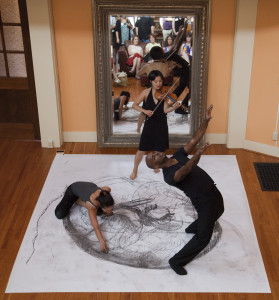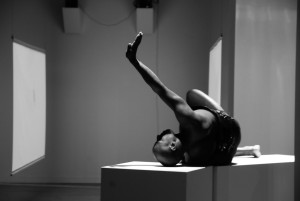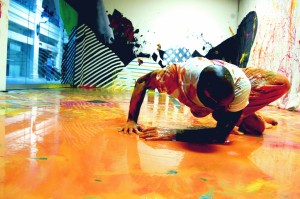Not only is Rodney Veal an adjunct faculty member at Sinclair Community College, University of Dayton and Stivers School of the Arts, but he also is a working artist and choreographer who thrives off happiness and passion.
“Happiness is the bottom line and passion is a key factor,” Veal said. “We all win when everyone is passionate.”
His happiness is focused and targeted on seizing opportunities to better him as a human being. It’s not about being super human, it’s about being a happy, pragmatic optimist, according to Veal.
“It doesn’t mean happiness is without a price or without the struggles,” he said.
Along with Veal being an adjunct faculty member in the dance and theater department, he is also in his second year as a completion coordinator in the creative studies for Connect for Completion at Sinclair.
“Basically, it’s helping students connect within their disciplines, but then also outside of their disciplines such as resources, career advice and career coaching,” Veal said. “This will help this whole process of getting a degree at Sinclair and to prep for the real world or transfer to a four year school.”
Valuing education and using it as an opportunity to explore who and what he is, is Veals way of evolving and making the most out of life.
“That’s my belief system and philosophy of education,” he said. “It’s never just about let me do this so I can make money.”
He said that’s the biggest issue with students today. It’s not about finding passion and happiness within a major or career—it’s about money.
“There is such a push and pressure to be financially solvent, but you can have a degree and still be jobless—that can’t be the only reason why you’re obtaining your degree. It has to be that you love what you’re doing because when the time comes that you get paid for it as a career, you’re going to have to enjoy the hours and the effort that you put in.”
Veal said that even though it’s important to be technically proficient, companies still look to see if you’re a happy and whole person.
“Yes in black and white you have your degree, but are you a good fit to the culture of the organization? Those factors do matter, so therefore, if you choose a job and major just because it’s going to make you money, I guarantee you that it’s going to trip you up at some point,” Veal said. “It’s either going to leave you hollow or flat. So why not choose the things that you honestly are saying to yourself ‘this is what I want to do.’”
Early on Veal said it was natural for him to be drawn towards arts and education. He said he had no desire to do anything else, except to always be learning and focusing on creativity.
“As a kid that’s all I did—just read about the world and then draw what I saw,” Veal said.
He said he lucked out to have parents who supported him in what he chose to do with his life. His passion for art was always encouraged by his parents because they saw how happy it made him.
“Even though they might not understand why I had an interest or a passion for these things, they weren’t going to get in the way,” Veal said.
Veal graduated from Eastern Michigan University with a dual major in Political Science and Visual Arts, and a Master’s from The Ohio State University in Choreography and Dance. He said he likes combining different visual arts to create one performance or art show.
“I like non-traditional dance,” Veal said. “It’s not just one discipline.”
Not only does Veal choreograph and perform, but he also is the host of Think TV’s “The Art Show.” The show focuses on arts and culture and airs every Sunday at 5:00 p.m., covering local, regional and national artists, while trying to expose people to new and different things.
“There’s a lot of importance and significance attached that I am an African American male on television talking about arts and culture,” Veal said. “I am really aware that my presence matters. I have a passion in arts in culture and I hope it comes off that way.”
On July 25, Veal and The Art Show won a regional Emmy competing against other nominated arts and entertainment shows from Ohio, West Virginia, Pennsylvania and Kentucky.
“It’s exactly like you’re going to the primetime Emmy awards—there’s a red carpet, swag bag, the whole nine yards,” Veal said.
Just when you think Veal has enough on his plate, he is still focusing on education and thinking about getting his PhD. He said he wants to design places that are conducive to the creative economy and use urban planning for an arts and cultural district in Dayton.
“We’ve cut into the bone as much as we humanly can for funding for the arts, even arts education, which I think is the biggest mistake ever,” Veal said. “Art is an economic tool and catalyst—it can’t be that frivolous if it can do all that.”
Art is the icing on the cake, according to Veal, and he wants to help Dayton rebuild the community around arts and culture because it plays a vital role in economic recovery.
“We go for the things that have a pretty package, that’s just who we are as human beings,” he said. “So how do we make Dayton the prettiest package?”
Veal said looking back, all he has done is work, but he is working in the things that he loves. He said happiness can be productive and fruitful, but it requires hard work, which will result in change. Once you start this process of learning and evolving it is life-long, and will be a guiding force in your life, according to Veal.
“It gives you the protective armor of living when you have this knowledge base that is so vast,” he said.
Teachers, employers and role models are going to open the door for you, Veal said. So students should run through the door and take everything that is in the room.
“Intellectual theft is not a bad thing,” he said.
When hunger and curiosity take place, this is what will drive the passion to learn and to consistently grow, according to Veal. He said if people aren’t willing to risk failure then they are playing it safe.
“If you’re not living on the edge, you are taking up space,” Veal said. “Conquer this fear that you’re going to be a failure—that’s a victory in itself.”
As long as people understand the necessity of making a living then they can focus on the things that drive their passion.
“If you’re passionately engaged, you’re a catalyst for change,” Veal said.
Gabrielle Sharp
Executive Editor

